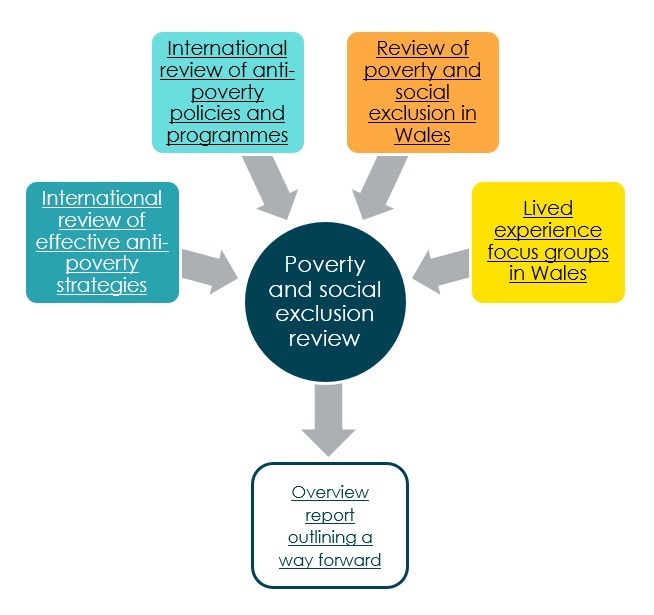The Welsh Government has consistently held addressing poverty and social exclusion as a primary policy objective and has initiated a variety of related schemes since devolution. These have included overarching strategies, such as the Welsh Child Poverty Strategy, to more specific policies and interventions across a range of poverty and social exclusion-related policy areas, such as education, employment, training, communities, and families.
The Welsh Government wishes to renew its commitment to tackling poverty and social exclusion and wants to build on and learn from what has been done previously in Wales, as well as to learn from other countries and places with effective poverty reduction strategies and programmes.
The Wales Centre for Public Policy (WCPP) was commissioned by the Welsh Government to conduct a review of international poverty and social exclusion strategies, programmes and interventions. A suite of reports has been produced as part of this project, reviewing a significant amount of evidence at different levels. It includes evidence of individual programmes that aim to tackle specific elements of poverty and social exclusion, through to what makes for an effective, national anti-poverty strategy. The review has drawn from quantitative, qualitative and lived experience evidence to ensure that the findings produced are up to date and provide an accurate representation of poverty and social exclusion in Wales. It also includes relevant evidence of what works internationally, to effectively inform findings and decisions moving forward relating to poverty alleviation in Wales.
The WCPP partnered with the New Policy Institute (NPI) and LSE’s Centre for Analysis of Social Exclusion (CASE), with support from expert advisors based in Wales, to deliver a review of international poverty and social exclusion strategies, programmes and interventions.
A total of 18 reports have been produced by the WCPP as part of its project on poverty and social exclusion for the Welsh Government:
- A review of international poverty and social exclusion strategies, concluding with a checklist of what makes an effective anti-poverty strategy, produced by the New Policy Institute (NPI);
- Reviews of international evidence on the effectiveness of policies and programmes that aim to tackle poverty and social exclusion, produced by the Centre for Analysis of Social Exclusion (CASE) at the London School of Economics (LSE);
- Two reports on poverty and social exclusion in Wales, produced by WCPP:
- The first report reviews quantitative evidence to provide an overview of past, current, and possible future trends in poverty and social exclusion in Wales;
- The second report reviews secondary qualitative evidence relating to the lived experience of poverty and social exclusion in Wales;
- A report outlining the results of four workshops conducted by WCPP across Wales involving people with direct lived experience of poverty and social exclusion; and
- An overview report that aims to bring together the significant amount of evidence produced for the project to frame and inform Welsh Government discussions on ‘what next’.
Associated blogs and podcasts:
What can Public Service Boards do about poverty?
How can councils support their communities through the cost-of-living crisis?
Investment in councils, investment in communities
PEP Talk Episode 13: Poverty and Mental Health
What makes for an effective anti-poverty strategy?
Running on empty: why we need reform in the cost-of-living crisis
Being poor in Wales - why where you live matters
Promoting pathways out of poverty – and preventing the pitfalls of poverty entry
Tackling poverty and mental health together: a multi-agency approach
What works to tackle poverty? Experimenting with a basic income in Wales
Amanda Hill-Dixon writes in themj.co.uk: Is basic income the answer?















